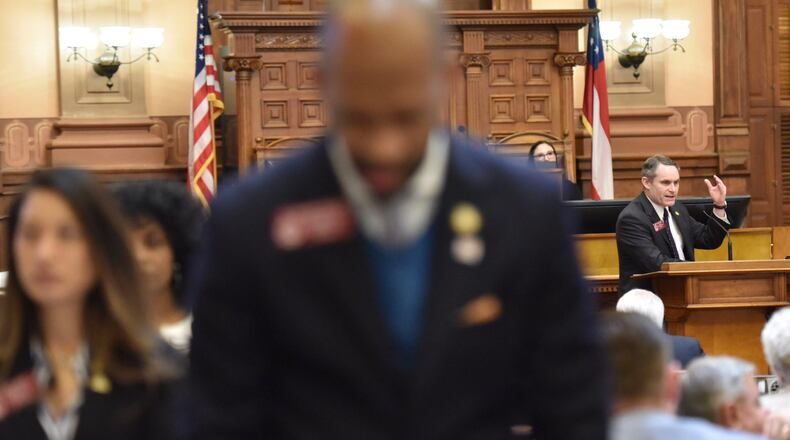The Georgia House voted 93-73 late Thursday to approve a bill that would outlaw most abortions once a doctor can detect a heartbeat in the womb.
The measure would be among the most restrictive in the country and abortion rights advocates have vowed to challenge the legislation in court if it becomes law.
A heartbeat is usually detected in a woman’s sixth week of pregnancy. Current Georgia law allows abortions up to 20 weeks.
Debate around the proposal was contentious and personal, with at least 20 Democrats standing with their backs turned while the bill's sponsor, state Rep. Ed Setzler, introduced his legislation.
“It shouldn't be a partisan issue that a child in the womb should be worthy of full legal protection,” the Acworth Republican said.
After being reprimanded by House Speaker David Ralston, R-Blue Ridge, a half-dozen women Democrats walked out of the chamber in protest of the vote.
"This is what women will be relegated to," said state Rep. Park Cannon outside the House chamber.
The Atlanta Democrat held a hanger with the names of Republican supporters of the bill, hinting at the tool some women used to end their pregnancies before abortion was legal in the country.
» Live: Use AJC tracker to follow Georgia bills
» Photos: Crossover Day at the Georgia Legislature
Speaking against the measure, Democratic state Rep. Renitta Shannon of Decatur refused to leave the podium at the end of her allotted time. Ralston cut her mic before security and her Democratic colleagues escorted her to the side.
The debate was emotional for many who spoke. Republican state Rep. Deborah Silcox of Atlanta tearfully told her colleagues she planned to vote against the legislation.
“I rise for my constituents and for those people because I was sent here by them to vote for them,” she said. “I just pray, Lord, that your will be done.”
Those who supported the measure spoke of the value of life.
"If a pregnant woman is murdered, it's a double murder," said state Rep. Darlene Taylor, a Thomasville Republican. "Baby fetus deserves to have a life."
Gov. Brian Kemp early Thursday urged House leadership to approve House Bill 481.
Kemp said Thursday in an interview with The Atlanta Journal-Constitution that the bill would help preserve the sanctity of life and uphold campaign promises that he and other Republicans made to restrict abortions.
“I campaigned on signing the toughest abortion bill in the country,” he said, “and this is the toughest one we’ve got in the Legislature now.”
Kemp initially backed legislation that would have created a “trigger law” to ban almost all abortions if the U.S. Supreme Court overturned the Roe v. Wade decision, which established a nationwide right to abortion. The legislation failed to get a hearing before the Thursday deadline.
After a wave of Republican defeats last year in Atlanta’s suburbs, Ralston has said he wanted to do more to insulate vulnerable House GOP incumbents who could face backlash for votes on social issues. But he’s also been a supporter of more abortion restrictions.
Other states have passed similar legislation, but all have been challenged in court.
Under the proposal, women still would be able to get later abortions in cases of rape, incest or if the life of the mother is in danger.
The measure now heads to the Senate.
Conservatives have made the heartbeat measure a leading priority, casting other pending efforts to restrict abortions as half-measures. Lt. Gov. Geoff Duncan added his voice to the effort, too, calling it an “easy decision for me.”
Setzler said that if a heartbeat is used to determine the end of life, it should be used to establish when life begins.
Doctors who oppose the legislation said the “heartbeat” detected at six weeks signals the practice motions of developing tissues that could not on their own power a embryo without the mother.
The U.S. Supreme Court ruled in its 1972 Roe v. Wade decision that abortions could be performed until a fetus has a viable chance at life outside the womb.
—Staff writers Greg Bluestein and David Wickert contributed to this article.
About the Author
Keep Reading
The Latest
Featured




